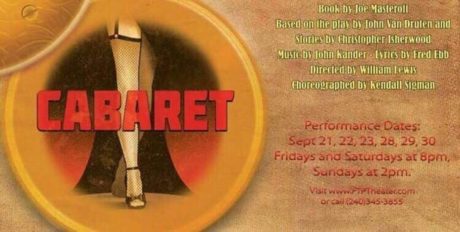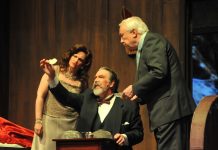The Emcee is worth the price of admission, and then some. In The Fredericktowne Players’ production of the Kander/Ebb hit, Cabaret, Lenore Mionette Florez is spectacular as the impresario of the Kit Kat Klub’s progressively darkening festivities. With her long arms and expressive hands, vocal range from a deep contralto to a clear upper range, sexy swagger, humor of several shades, and ultimate vulnerability, Florez gives the role energy, variety, and depth, well beyond traditional interpretations of the role. Her vocal work in the introductory “Wilkommen,” the funny “Two Ladies” and “If You Could See Her Through My Eyes” (well, funny until its last line), the all-too-true “Money,” and finally, and perhaps best, “I Don’t Care Much,” is perfect not only technically but in setting the tone of a scene. This is “best actor in a musical” award quality work.
The 1998 version of Cabaret that FTP presents is a substantial revision of the original 1966 version of the show, which in turn was ultimately based on the Berlin Stories of gay British writer Christopher Isherwood. Like all revisions, it has pros and cons. Among the plusses are additions of fine songs like “I Don’t Care Much” and “Maybe This Time,” sung with emotional force by Robin Samek as Sally Bowles. Among the minuses is the hash the script makes of the sexuality of male lead Cliff Bradshaw (Danny Santiago). Trying perhaps to blend the straight American innocent abroad of the 1966 version with Isherwood’s uncompromising gayness, the script makes Cliff apparently, though not very joyfully, bisexual. Much is made of this in the early scenes of Act 1, but it has no consequence or even mention later. Making and then abandoning a point does not make dramatic sense.
Santiago begins by playing his awkwardly written role as a nerdy beta male, though he gets to be politically awakened and more assertive – and feeling entitled to order his girlfriend about – in Act 2. He is in good voice for the one bit of singing remaining to him in this version, part of the sprightly “Perfectly Marvelous” with Sally.
Samek gets the brashness, neediness, and underlying hopelessness of Sally. The challenge of this role for an actor is to play convincingly a character who is a not very good performer at a third-rate nightclub while singing her songs at a high level. Samek succeeds, both in entertainments like “Don’t Tell Mama” and “Mein Herr” and, above all, in her signature number “Cabaret.” She begins the song as a frightened, wounded woman whose singing reflects the chaos of her life and ends with a defiant belt. She immediately follows up with a wrenching book scene as, shivering with cold and emotion, she severs her ties with Cliff.
The secondary couple is Fraulein Schneider (Nancy Illman), Cliff’s landlady, and Jewish fruit seller Herr Schultz (Brett Cassidy). Cassidy plays Schultz as a very hearty and kind fellow, also singing his role effectively. Illman has some difficulty with Schneider, particularly in her most important song, “What Would You Do?” in which her character reads as more self-pitying than resolute. Schneider is world-weary and deeply pragmatic, but there isn’t an ounce of self-pity in this survivor. It might have been interesting to see her direct some of her questions out to the audience, as well as to Cliff.
The 1998 version diminishes the two Schultz/Schneider duets by upstaging the characters. The Emcee makes a skillful entrance, using a pineapple as a sort of scene partner, drawing focus from Schneider and Schultz during “It Couldn’t Please Me More.” During the tender “Married,” Fraulein Kost (Julia Donato), sings a German equivalent of the song on the upstage center platform. This is a nice, well-sung moment for Kost, the local hooker, deepening her character, but Schneider and Schultz get sidelined in the process.
Kost teams with Ernst Ludwig, played with fey Gemütlichkeit by Mike Warhauser, to bring the political message of the show to the fore in “Tomorrow Belongs to Me,” earlier sung with youthful enthusiasm by a club waiter (Lee Schwetje). The ensemble moves and sings well, executing Kendall Sigman’s Fosse-influenced choreography with energy and sexiness if not always perfect precision. The movement design in comic numbers like “If You Could See Her Through My Eyes” and “Two Ladies” is delightful.
There are physical and administrative constraints in mounting a show at the Kussmaul Theater at Frederick Community College, and these constraints may have affected Heather Pomerantz’s set design, consisting of a central platform with an arch and curtain and two moveable arches to either side. There is no masking available for actors’ entrances or Alex Ruth’s excellent band; distraction results.
Lisa Shinn provides some excellent costumes for the cast, memorably the Emcee’s satiny, oriental-influenced robe, as well as her shiny dress in “I Don’t Care Much.” The ensemble wears simple but sexy black outfits. Schneider’s dress in the party scene is quietly elegant. In 1930, Nazis attacking opponents would have been Brownshirts, not wearing the blue/gray uniforms of later years. Mike Brown’s lighting, in its use of multicolored and sometimes alternating lights, adds some needed nightclub glitz to the surroundings.
A problem for Cabaret, in all its versions, is that it carries a strong, historically unfounded, implication that Weimar decadence and sexual freedom somehow enabled the rise of Nazism. Having the denizens of the Kit Kat Klub pivot on a dime from sexual frolicking to goose-stepping is untrue to the life and spirit of the German cabaret scene of the era, which was heavily leftist and Jewish, the home of opposition to and satire of fascism (e.g., the cabaret career of fervent anti-Nazi Marlene Dietrich).
As director William Lewis points out in his program note, Cabaret has had continuing relevance since its debut during the 1960s civil rights movement era, all the more now as authoritarianism abroad and at home gains prominence. His vibrant, well-paced production brings this theme home through memorable songs and characters, giving the audience high entertainment value while creating something worth thinking about.
Running Time: Two hours and 30 minutes, including one intermission.
Cabaret, produced by The Fredericktowne Players, runs through September 30 at the Jack B. Kussmaul Theater on the Campus of Frederick Community College, 7932 Opposumtown Pike, Frederick MD. For tickets, call the box office at (240) 315-3855 or go online.





